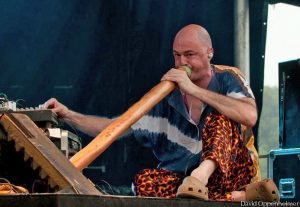
Dr. Didg – Graham Wiggins at All Good Festival on July 9, 2010 performing in Masontown, WV performing the first show in three years.
Graham Wiggins was an American musician. He played the didgeridoo, keyboards, melodica, sampler, and various percussion instruments with his group, the Boston, Massachusetts-based Dr. Didg.
Graham Wiggins was born on October 25,1962 in NewYork City. Wiggins held a D.Phil in solid-state physics from Oxford University, where he earned his nickname Dr. Didg while testing his didgeridoo in the Clarendon physics laboratory. He helped develop new technology for Siemens MRI scanners, including a 32 channel head coil.
Wiggins was born in New York to an Australian mother and a British father from Abingdon, Oxfordshire, and grew up in New York. He graduated from Paul D. Schreiber High School in Port Washington, NY in 1980. Although his first instruments were piano and horn, he first taught himself to play the didgeridoo while a physics student at Boston University in 1982, after hearing Warren Senders demonstrating a cardboard-tube didgeridoo as part of a “world music” concert series in Boston. He graduated from Boston University in 1985, relocating to Oxford, England for postgraduate study. In order to earn extra money there to complete his doctorate he also performed as a busking didgeridoo player.
In 1983 Wiggins invented a keyed version of the didgeridoo, which allows it to be played melodically somewhat in the manner of an ophicleide, a keyed brass instrument which Wiggins was able to try at the Bate Collection, a musical instrument museum at Oxford University’s Faculty of Music in St Aldate’s, Oxford. The first prototype was made out of a cardboard wrapping paper tube and had first only one, then four valves, allowing the instrument to play a total of five distinct pitches. He used it in only one concert, after which it fell apart. He then made the keyed didgeridoo he currently uses in 1990, using the machine tools at the Clarendon Laboratory at Oxford University. It is made from wengé (an African hardwood) with brass hardware. It has eight keys, which allows for the playing of nine different pitches. He unveiled it publicly for the first time on the British national television program called Tomorrow’s World. The instrument may be heard on several Dr. Didg tracks, most notably “Sub Aqua,” on the 2002 CD Dust Devils, as well as “Sun Tan,” on the 1994 CD Out of the Woods.
In 1988 he formed the core of Outback with guitarist Martin Cradick, a band that blended Australian tribal sounds with modern music. He obtained a record deal before completing his thesis. Following the dissolution of that group in 1991, he spent two months in early 1992 living in the Aboriginal community of Galiwinku on Elcho Island, off the coast of Arnhem Land, in Australia’s Northern Territory, where he studied the advanced traditional didgeridoo techniques of the area. With the exception of a few songs such as “Brolga,” Wiggins’ compositions are generally not based primarily on traditional Aboriginal structures, but instead on the use of the instrument’s percussive, rhythmic, and melodic capabilities. In 1993 Wiggins formed the group Dr. Didg, with which he still performs. In 1994 he began using the technique of live sampling, which became the foundation of the Dr. Didg album Out of the Woods (1994).
Wiggins played with the Grateful Dead in 1993 at the Mardi Gras show at the Oakland Coliseum in California, and recorded with Mickey Hart on the albums Mickey Hart’s Mystery Box and Supralingua as part of the Grammy Award-winning ensemble Planet Drum. After a few years hiatus, Dr. Didg began touring again in 2010, including performances at the All
Good Music Festival at Marvin’s Mountaintop in Masontown, WV, and Meeting of the Minds III in Poynetelle, PA.
After 15 years living in Oxford, Wiggins moved back to Boston in the spring of 2000. Wiggins passed away on September 7, 2016.
In the Facebook post, Wiggins’ bandmates wrote that his death “was quite a shock” and called Wiggins “one of the most well-informed and classiest persons you could know.”
https://en.wikipedia.org/wiki/Graham_Wiggins
* * * * *
Other Notable Musicians’ Deaths…
September 2016:
12: Hidayat Inayat Khan, 99, English-French composer and conductor; Tavin Pumarejo, 84, Puerto Rican actor, comedian and jíbaro singer.
11: Leonard Haze, 61, American drummer (Y&T), chronic obstructive pulmonary disease.
10: Chris Stone, 81, American recording studio owner (Record Plant) and entrepreneur, heart attack and stroke; Knut Wiggen (sv), 89, Norwegian composer.
8: Johan Botha, 51, South African operatic tenor, cancer; Prince Buster, 78, Jamaican ska musician (“One Step Beyond”, “Al Capone”).
7: Clifford Curry, 79, American beach music and R&B singer (“She Shot a Hole in My Soul”);
Farhang Sharif, 84–85, Iranian musician and tar player; Graham Wiggins, 53, American musician.

